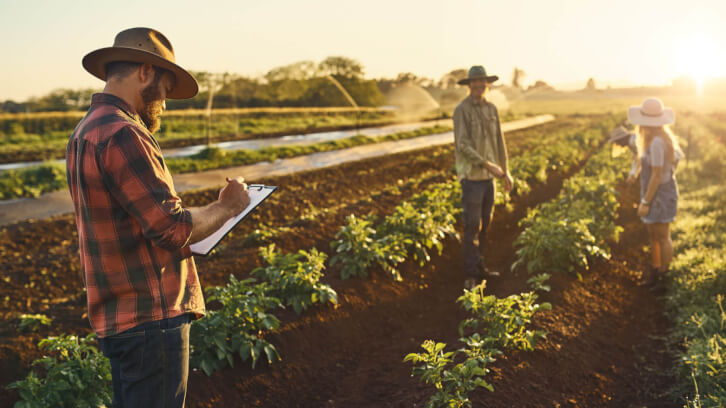Facilitated by the American Botanical Council’s Sustainable Herbs Program, the group brings together seven companies in the tea and dietary supplement space including Banyan Botanicals, Nature’s Sunshine, Pure Synergy, Pukka Tea, Traditional Medicinals, Pacific Botanicals and Yogi.
“The climate crisis is changing how we work together,” said Ann Armbrecht, founder and director of the Sustainable Herbs Program (SHP). “These seven companies coming together to share emissions data will benefit not only their bottom line but also their farm partners, consumers, the herbal industry and the environment.”
The working group, which grew out of a series of monthly meetings sparked by a SHP webinar on the carbon footprint of tea, debuted at the recent Expo West natural products trade show in Anaheim, CA with a panel entitled “Navigating Scope 3 Data Challenges Through Collaboration”.
The challenges of calculating Scope 3 data
Understanding, measuring and reducing Scope 3 emissions (classified as activities within an organization’s supply chain not directly controlled by the organization) poses several unique challenges compared to the carbon footprinting of commodity crops like wheat, cacao or coffee.
Complicating factors include variability in outcomes and in production methods across a diverse range of herbs, along with the absence of readily available CO2 emissions data. Herbs do not benefit from the same large life cycle assessment datasets as conventional crops, meaning that proxies for herb-emissions data are often used—whether sourced from a study in a similar agricultural region or approximated from an analogous crop.
“Unfortunately, it is common for these proxies to be wildly incorrect—even in cases where we utilize the correct secondary data point,” said Taylor Clayton, sustainability impact manager at Traditional Medicinals. “This happens because each farm utilizes unique and different practices, and even small variations in those practices can result in vastly different emissions outcomes.”
The group will evaluate individual supplier data to determine whether variation is significant enough across regions and farm practices to consider multiple emission factors per herb type.
Do unto the planet
According to the U.S. Environmental Protection Agency, agriculture accounts for approximately a quarter of global emissions, making it a significant driver of climate change. The resulting rise in global temperatures and extreme weather events is already impacting growth cycles and crop yields. Measuring emissions is thus a crucial step to mitigate these negative impacts and ensure the long-term sustainability of herb cultivation.
“Ayurvedic principles teach us that we are nature, and our health is intimately connected to the health of the planet,” said Erin Douglas, senior social and environmental responsibility manager at Banyan Botanicals. “What we do to the planet, we do to ourselves.”
The shared footprint assessments will focus primarily on cradle-to-farm gate emissions, associated with on-farm inputs related to planting, growing, harvesting, and in most cases, the processing and drying that occurs on site.
The group acknowledges that as individual companies they may have to expand their boundaries to capture off-farm emissions but noted that herb drying for tea bag cut ingredients and both drying and extraction processes for extract-derived ingredients are often the biggest sources of Scope 3 emissions.
Not data for data’s sake
The project began by pooling resources to enlist the services of German consulting firm Sustainable Ag to review the companies’ existing emissions factors and develop a methodology for gathering new emissions data.
Upon completion of this initial phase, Sustainable Ag will lead the group through the first four emissions factor calculations (for ginger, peppermint, nettle and wild-harvested licorice) as pilot to test the methodology. Training on the generation and interpretation of herb emissions factors will follow to strengthen internal capacity and ease the data-gathering burden on suppliers.
The project has narrowed the herbal kingdom down to 21 priority flowers, leaves and roots based on order and spend volumes, brand or product identity, long-standing interest in specific ingredients and significant supplier relationships.
“This is not a data exercise for the sake of data,” Armbrecht said. “Each company is focused on translating the insights and findings of this project into action.”
Once the initial set of priority herbs is mapped and the consulting agreement is concluded, the working group says it will continue to collaborate with suppliers on sustainability initiatives that directly help mitigate climate change and build more resilient supply chains. It also plans to publish a white paper with preliminary results later this year and will explore ways to make the emissions data more widely available to other companies in the industry.
Zacharia Levine, director of people and sustainability at The Synergy Company (Pure Synergy), also noted that while the project is focused on developing a cost-effective, scalable and generalizable process for calculating emissions, it is accompanied by an emerging conversation about purpose and impact outside of carbon accounting in the supply chain.
“There are other environmental impacts beyond carbon, such as biodiversity impacts, soil health, waste management, etc.,” he said. “There are societal and community impacts such as fair labor and women’s education. And not everything that can be counted matters. Not everything that matters can be counted.”
